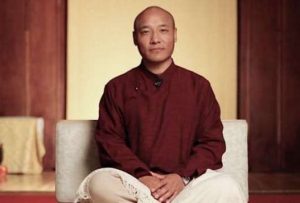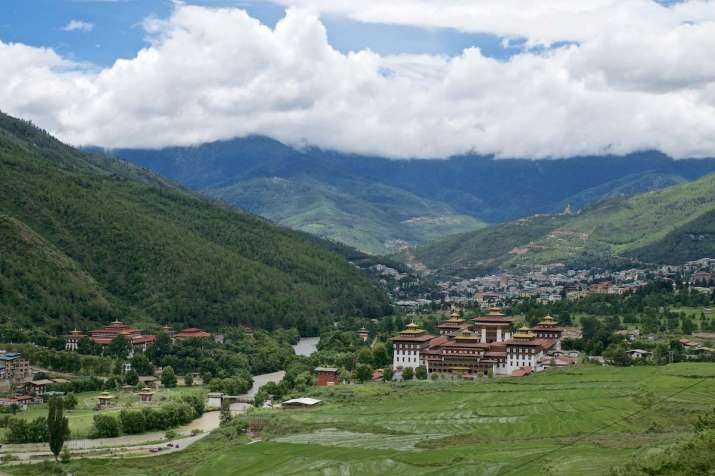
THIMPHU—The Himalayan kingdom of Bhutan is hosting the International Vajrayana Conference in the capital Thimphu. The three-day Buddhist summit, which opened on Tuesday and will run from 28–30 March, welcomes a gathering of some 250 participants from 33 countries, including 45 delegates who will provide presentations on a broad range of themes and perspectives, including the role of Vajrayana Buddhism in the 21st century, applications of the teachings in healthcare and education, the relationship with modern science and neuroscience, female monasticism, and yoga and meditative practices.
The event is organized by Bhutan’s Central Monastic Body and the Centre for Bhutan studies & GNH (CBS) with the aim of offering practitioners, researchers, and academics from around the world a platform upon which to share and exchange their research, findings, and experiences related to Vajrayana Buddhism in order to help preserve and promote the tradition’s profound teachings for contemporary society. The gathering, which follows the inaugural conference held in 2016,* also celebrates the 50th anniversary of formal diplomatic relationship between India and Bhutan, which was established in 1968, and by extension the shared heritage between Bhutan and India of the Buddhist spiritual tradition.
The opening ceremony was led by the prime minister of Bhutan, Lyonchhen Dasho Tshering Tobgay, and Dasho Karma Ura, president of the forum’s organizer, CBS—a social science research institute that conducts inter-disciplinary studies for advancing Bhutan’s social, cultural, economic, and political wellbeing. CBS is also tasked by the government with conducting and coordinating research and other activities related to Bhutan’s development concept of Gross National Happiness (GNH).
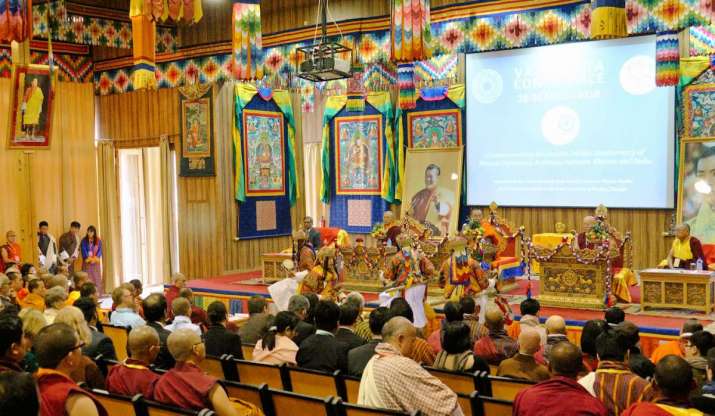
“This conference is a special one,” Dasho Karma Ura observed in his welcoming remarks, “because of the combination of two aspects of this conference: one is the subject matter itself, which is very dear to Bhutan, the Bhutanese people, and the Bhutanese government, and the second is the attendance of an extraordinary number of high lamas and academics at this conference.”
Bhutan, nestled in the foothills of the Himalayan mountain range, and sandwiched between the two political and economic heavy hitters India and China, is the world’s last remaining Vajrayana Buddhist country. The spiritual tradition is embedded in the very consciousness and culture of this remote land, where it has flourished with an unbroken history that dates back to its introduction by Padmasambhava, also known as Guru Rinpoche, in the 8th century.
“In many ways, this series of conferences on Vajrayana is very special, if not unique in the world, bringing academics and practitioners together to share their experiences and findings. Discussions and debates at the conference, and publications of the proceedings thereafter, have contributed to the outstanding formation of a bridge between individuals in academia and spirituality,” Tshering Tobgay said in his keynote address.
“The broader aim behind this series of conferences in to explore social, economic, spiritual, and cultural configurations of society that favor the realization of the Vajrayana view of human potential,” the prime minister continued. “There are now many competing views of ideals of human existence and potential, which drive the activities of peoples and states. But the Vajrayana view of human potential and the methods to realize them was what Guru Rinpoche brought to us in the Himalaya and Tibet from India in the 8th century. Part of the view and method of wisdom he brought was an approach toward structuring the mind to non-duality and the cultivation of a different kind of consciousness.”
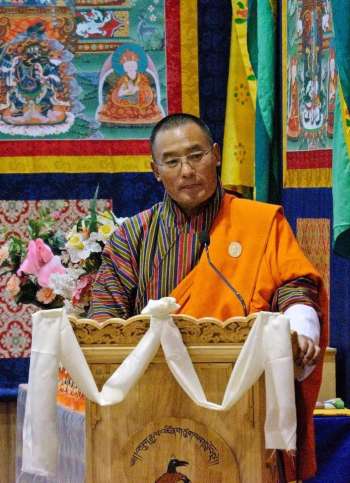
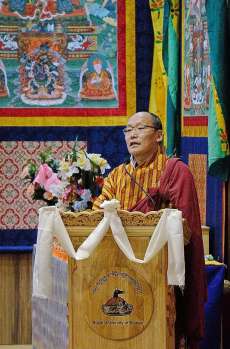
With a population of just 780,000 people, Bhutan is perhaps best known for its sustainable approach to environmental stewardship,** and for prioritizing “Gross National Happiness” (GNH) over the shortsighted acquisitiveness of economic growth. The remote kingdom has achieved international renown for its GNH philosophy, first introduced in the late 1970s by Bhutan’s fourth king, Jigme Singye Wangchuk, drawing inspiration from the kingdom’s traditional Buddhist culture. While not opposed to material development or economic progress, GNH eschews the widespread view of economic growth as the ultimate good, instead seeking to cultivate a holistic approach to balanced development and societal well-being, emphasizing sustainability, conservation, and translating cultural and social priorities into developmental goals to create a happier, more equitable society.
Almost 75 per cent of Bhutan’s population identify as Buddhists, according to data for 2010 from the Washington, DC-based Pew Research Center, with Hinduism accounting for the majority of the remainder. Most of Bhutan’s Buddhists follow either the Drukpa Kagyu or the Nyingma school of Vajrayana Buddhism.
* Bhutan Convenes Inaugural International Conference on Vajrayana Buddhism (Buddhistdoor Global)
** Bhutan’s conservation policies and high level of forest cover means that not only has the kingdom met its pledge to remain carbon neutral, it is one of the Earth’s rare but essential carbon sinks, with its forests absorbing more carbon dioxide than the country produces.
See more
Vajrayāna Summit (Centre for Bhutan studies & GNH)







